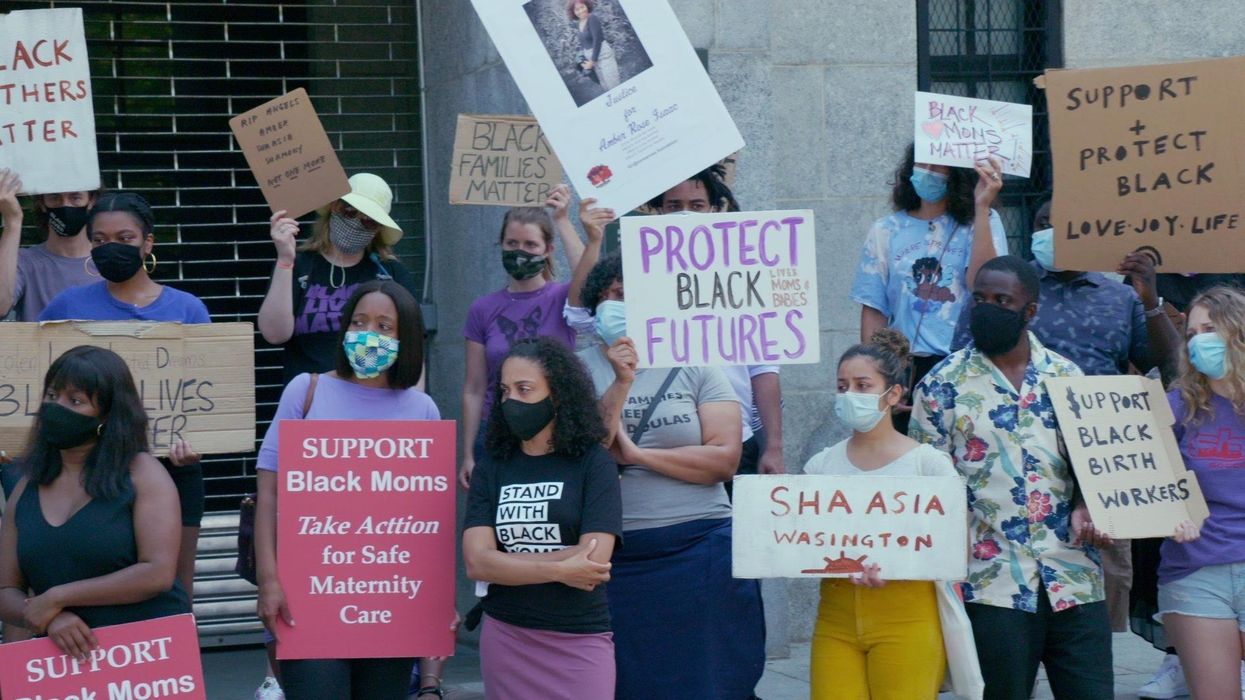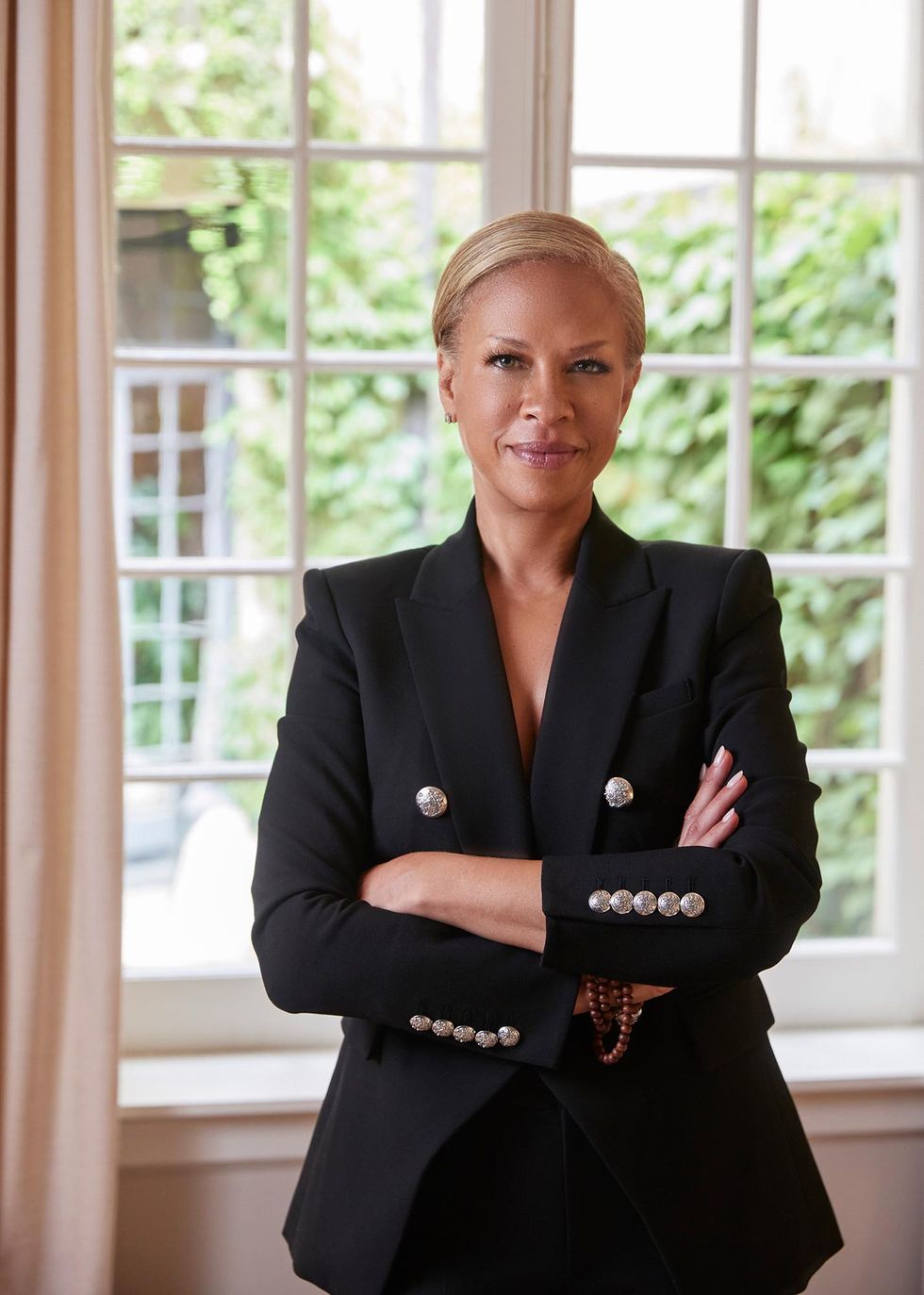The Black Maternal Mortality Crisis Proves Black Women Are Too Often Ignored
Coveteur sat down with ‘Aftershock’ Director Tonya Lewis Lee to discuss the making behind her documentary, which explores the issue during a critical time for reproductive health.

Many are surprised to learn that the United States has the highest maternal mortality rate among developed nations. Sadly, the weight of that reality is disproportionately felt by Black women and their loved ones. According to the Centers for Disease Control and Prevention (CDC), in 2020 the maternal mortality rate for Black women was 2.9 times higher than their white counterparts. With the Supreme Court’s recent decision to overturn Roe V. Wade, many predict the number of women who lose their lives during or after pregnancy will continue to rise without seismic cultural and political change.
This stark reality is reflected in Hulu’s latest documentary, Aftershock. Released on July 19, Aftershock explores the Black maternal mortality crisis and the destructive toll it has taken on countless Black families. The gripping documentary captures the aftermath of two preventable tragedies: the deaths of Shamony Gibson and Amber Rose Isaac—two Black women whose lives were tragically cut short as a result of pregnancy/birth-related complications. Still reeling from the pain of losing their loved ones, the families of these women muster the strength to become advocates for Black women and their families across the nation, and the collective force of change this country desperately needs.
During a critical time for reproductive health, Coveteur sat down with Aftershock Director Tonya Lewis Lee to discuss the making behind the documentary, what's missing from the conversation about the Black maternal mortality crisis, and the importance of listening to Black women who are too often the canaries in the coal mine for what is to come for all women across the nation.
What sparked your interest in working on a documentary about the Black maternal health crisis?
“As a storyteller in general, I love the idea of focusing on Black families and Black mothers. I wrote children's books Please, Baby, Please and Please, Puppy, Please and that got the attention of the U.S. Department of Health and Human Services. They asked me to be a spokesperson for a campaign to raise awareness about Black infant mortality and that’s what got me really interested in women’s health. I was learning so much from being out on the road and having the chance to talk to groups of women, particularly Black women, about what we were up against when trying to access our healthiest lifestyles. Eventually, I ran into more and more Black women who were sharing stories of losing friends or loved ones who died as a result of maternal health complications. Then one day, I received a call from an old classmate of mine. He told me that his wife had died from childbirth complications and that just broke my heart. The more I learned, the more I realized that there is a better way to do this and we have to fight for it.”
What do you think is missing from the national conversation about the Black maternal death crisis?
“The thing that has been missing that we try to capture with the film is that Black women dying from childbirth complications is not just because she was not well or that she was not getting care. But really because when a Black woman shows up and expresses that she’s feeling ill—that something is not right with her body—she is often dismissed and ignored. She is not seen and she is not heard. That is really at the root of what is causing so many deaths.
In the documentary, Amber Rose Isaac’s story really demonstrates this. She was presenting at her doctor's office with symptoms of fatigue and exhaustion. She was working as a preschool teacher and felt like she needed time off to get rest. When she was telling her doctor that she was really tired and fatigued, the doctor blew it off as, ‘Well you're pregnant and pregnant women are tired.’ Yet, it was in her records that her platelet levels were dropping. If that doctor would have actually just looked at the records and heard Amber’s symptoms, she could have treated her health syndrome and she may still be here today. She wouldn’t have had to have an emergency C-section, which led to her hemorrhaging and dying. To me, Amber’s case is so emblematic of the way the health care system often overlooks and disregards Black women.”
Is there anything else about this crisis that you learned while working on the documentary?
“The other key piece to this story is that there is an over-medicalization of birth in this country, which then leads to problems. People forget that birth is not a pathology: It is a natural process. Unfortunately, the medical system too often wants to intervene. They want to get the thing going, so they give pitocin and pain medication. [Health care workers] want to operate at the behest and schedule of the doctors. I once heard the story of a woman whose doctor planned her birth a month early because he was going on vacation and he wanted the baby to come when he was around. So they induced her and of course the baby wasn’t coming because she wasn’t ready yet. As a result, they had all sorts of complications. Eventually, they had to break the baby’s clavicle in order to get her out. Stories like these sound so barbaric and horrific and sometimes these actions are taken simply to accomodate a doctor’s schedule.
In contrast, we filmed with student midwives, which didn’t make the film. But it was really wonderful to hear these women who are warriors looking to protect the rights of women when they are birthing and how they see themselves as being the ‘guardians at the gate’ charged with protecting women’s dignity. It’s beautiful to see how dedicated they are and how midwifery and anti-traumatic care can have profound positive impacts on the experiences of women who are birthing. I think the health care system will truly benefit from having midwifery care integrated into women’s health care because it focuses on education versus providing critical care. Midwives help women understand their body from menstruation through menopause and the absence of that education in our typical maternal health care was so profound to me. A midwife named Helena Grant once told me, ‘When a woman is birthing, she is not just birthing a baby, she is birthing a mother.’ I understand her message so clearly now. Birthing should be both empowering and maternal-focused.”

Tonya Lewis Lee, director of 'Aftershock.'
Photo: Onyx Collective
Do you think the overturning of Roe v. Wade impacts the maternal death crisis?
“There is absolutely a direct connection between the overturning of Roe v. Wade and the maternal health crisis. Abortion rights is fundamentally maternal health care. Women having to carry to term a pregnancy and birth children that they don't want for various reasons can be devastating to womens’ health and wellness. Also, there is a study that found maternal deaths will increase because of that decision. I believe it is estimated to increase by 21 percent in the general population and up to 33 percent for Black women. I also worry about the criminalization of women who have miscarriages and the delayed care of women because of this decision.
So, the overturning of Roe has profound effects on women’s health in general. When we talk about maternal health and access to abortion care, it’s really all one conversation, and Black women need to be centered in the conversation because we are the canaries in the coal mine. Even if people don’t care about Black women, they should be concerned about what happens to us because it always inevitably impacts the general population. For example, we talk about health disparities and equities when comparing that Black women are dying at rates higher than white women in this country, but the fact is that white women are dying at higher rates than their counterparts in other industrial countries. The 52 percent of white women who voted for Trump the first time, too often I hear from them that they didn’t think it was going to be like this. And I wonder, how not? For Black women, what Trump did to upend women’s access to maternal health care was not a surprise. It was more like, ‘What did you think was going to happen?’ Ultimately, we are all in this together.”
How can we get involved in this movement to end the maternal mortality crisis in America?
“Elections matter—both local and national. People need to vote. There’s legislation that’s moving through Congress right now to extend Medicaid coverage for women for a year postpartum because many of these deaths happen postpartum, often at least a year after giving birth. We need to galvanize support for these types of legislation.
There also needs to be a cultural shift of how we think about birthing in this country. For example, when someone tells you that they want to have a midwife, we shouldn’t be responding by turning up our nose. We should be a little more open [to] what that means. We should not be focusing on the fear aspect of birthing so much and instead put more focus on the empowerment aspect of birthing.”
What do you hope for the future of maternal health in America?
“[In the] future, I hope that our institutions, colleges, hospitals, and insurance companies have gotten together and talked. That they have done bias training. I hope they understand that they are in partnership with their patients and that birthing is a woman’s choice. Another big thing is postpartum care. Typically after a woman gives birth, she’s not seen by a doctor until six weeks later. It’s my hope that in the future, women are seen days later, weeks later. I envision a future where women look forward to birthing and the empowerment that can come when it’s done right.”




